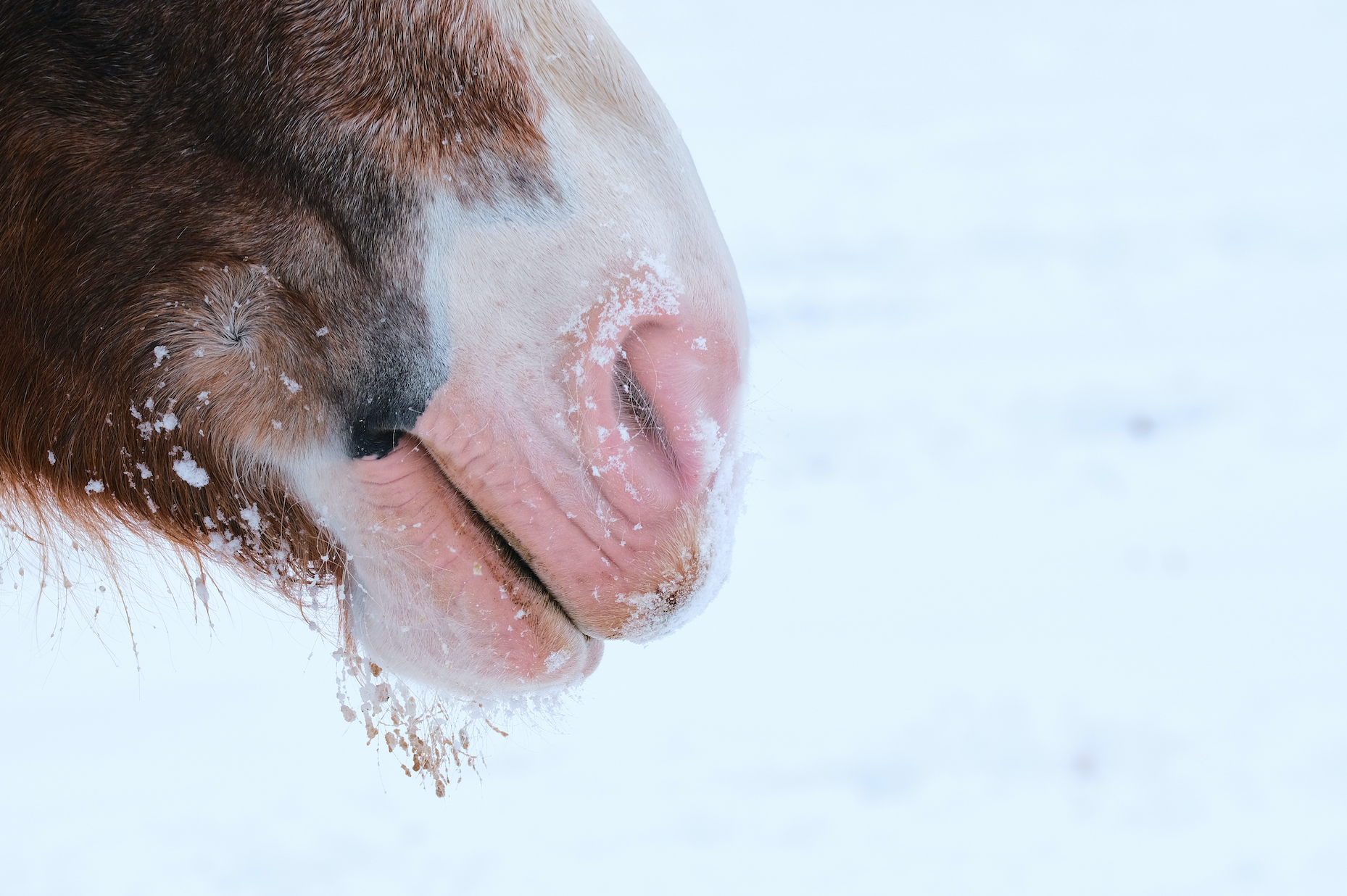Many horse owners are aware of electrolytes and understand that their horse may need to be supplemented with them in the summertime–when sweat losses are often highest. However, what about during the winter? In this article, we aim to answer that question and provide all the information you will need about equine electrolyte supplementation, in general.
What are Electrolytes?
To put it simply, electrolytes are minerals that carry an electric charge. It is this electric charge that not only gives electrolytes their name, but also gives them their power to maintain fluid balance and assist in many electrochemical processes in the body such as muscle contraction, nerve cell response, and even digestion. Without electrolytes, horses (and all animals, for that matter) simply could not function.
With that said, the five most important electrolytes include:
- Sodium (Na+)
- Potassium (K+)
- Chloride (Cl-)
- Calcium (Ca2+)
- Magnesium (Mg2+)
Horses consume these five electrolytes when they eat forages and feed, but they will need an additional source of sodium and chloride. This is why it’s recommended that all horses have access to loose salt or a plain, white salt block.
Does My Horse Need Additional Electrolytes?
The average horse at maintenance will typically have their electrolyte needs met through their diet (and an added source of salt). However, all horses lose electrolytes through urine, feces, and sweat. Hardworking horses can have high electrolyte losses due to high amounts of sweat loss.
Horses sweat to cool down when exercising, but their sweat is hypertonic, meaning it contains a higher concentration of minerals when compared to human sweat.
In hot or humid weather, hard-working horses can produce up to 10-15 liters of sweat per hour. Sodium and chloride are lost in the highest amounts, followed by potassium, calcium, and finally, magnesium. If electrolyte levels become unbalanced or depleted, cell function in the muscles, gut, and heart can slow or possibly even shut down.
When horses lose a large volume of sweat, this is when electrolyte supplementation is needed to bring these minerals back into balance in the body. In fact, supplementing with electrolytes after they’ve been lost through sweat will help to return normal fluid balance and restore electrical impulses.
Interestingly enough, the large intestine is a reservoir for electrolytes, and when excessive sweating occurs, the horse will tap into this reservoir and deplete it. Supplementing electrolytes can help to replace this reservoir.
As an added benefit, electrolytes stimulate thirst (similar to eating a salty meal). As a result, horses will drink more to further improve their hydration status.
If your horse is undergoing exercise that results in more sweating than just “under the saddle pad”, consider supplementing with electrolytes. You may even want to supplement for several days after prolonged periods of sweating to make up for these losses. If you are going on a weekend trail ride or to a competition during hot weather, you can start supplementing electrolytes several days in advance and continue supplementation throughout the event to make sure your bases are covered.
Aside from high sweat losses, a secondary need for electrolytes is during a gastrointestinal disturbance that results in loose stools or diarrhea. These types of disturbances can also lead to dehydration, so the use of electrolytes can support fluid balance under these circumstances.
Signs That Your Horse Needs Electrolytes
If you’re ever in doubt of whether to supplement electrolytes to your horse or not, the following are some signs that they are needed:
- It’s hot and/or humid outside and your horse is sweating more than normal
- Your horse is in moderate to intense training or exercise (sweating more than just under the saddle pad)
- Your horse is experiencing or recently experienced GI upset that resulted in diarrhea
- Your horse participates in full-day work
- Your horse is undergoing long-distance transport
Why Supplement With Horse Electrolytes in Winter?
So back to our original question: do horses ever need electrolytes supplementation in winter? As a general rule, the answer is this: not as much as they might in summer. However, there are some exceptions to this rule.
For one, if you live in a warm climate and your horse is still sweating with exercise during winter, then they will still be experiencing electrolyte losses.
Two, even in cold weather, horses undergoing hard work or all-day work may still experience higher-than-normal sweat losses. No matter the season, you can always use sweat loss as a guide to whether or not your horse may need electrolyte supplementation.
Third, if your horse experiences diarrhea in winter (or any time of year), electrolyte supplementation is always a good idea.
And finally, electrolytes can also be supplemented during extreme cold conditions to better promote hydration. Because horses tend to drink less in cold weather, this often leads to problems like impaction colic. Adding loose salt or electrolytes to your horse’s feed ration can stimulate thirst and increase hydration.
What to Look for in Horse Electrolyte Supplements
When looking at electrolytes for your horse, one thing to keep in mind is that not all supplements are created equal. Many contain sugar and other fillers which aren’t desirable–especially for horses with insulin resistance, Cushing’s disease, or other metabolic conditions. However, no horse (or human) needs added sugar in electrolytes.
Before making a purchase, always read labels on supplements to ensure that the five most important electrolytes are being provided without added sugar. Be aware that sugar will often appear as “dextrose” on ingredient lists or labels.
Electrolyte Paste for Horses or Powder – Which is Better?
Electrolyte supplements for horses often come in two forms: paste and powder. The Four Sixes Ranch Nutriments offers both forms:
- Electrolyte Recover is our powder formula that can be top-dressed daily on feed. The powder provides easy administration on a horse’s normal meal and most horses will readily consume it this way. This is perfect for daily use all year round.
- Electrolyte Paste can be given any time, any place and is designed as a one-time dose. The paste is great for travel and immediate use after an intense day of work or a performance event.
Both of the 6666 electrolyte supplements are formulated with the same concentration of electrolytes and B-vitamins. Both are highly palatable; it just depends how you want to feed them.
Why Do the 6666 Electrolytes Contain B Vitamins?
B Vitamins are water-soluble vitamins that play a role in energy metabolism and support many cellular functions in the body. Specifically, B Vitamins are often cofactors for the enzymes responsible for generating energy.
A cofactor is a chemical compound that is bound to a protein and required for that protein to work. Without B Vitamins serving as enzyme cofactors, the enzyme cannot work properly and energy is not produced efficiently.
If you think of the trendy Vitamin B-12 injections, commonly given to people, the treatment leaves them feeling more energized and able to perform at higher levels. The same is true for B Vitamins for horses.
All horses make B Vitamins in their large intestine (the electrolyte reservoir). However, in hard-working horses, the large intestine is often unable to keep up with the high demand for B Vitamins. To remedy this problem, we’ve added B Vitamins to the 6666 electrolyte supplements to better support these performance horses.
In Summary
Electrolytes are an important part of every horse’s diet and fortunately, a part that is easily supplied by forages, feed, and added white salt.
However, hard-working horses and those that experience gastric upset resulting in diarrhea will likely need supplementation to bring these crucial minerals back into balance.
Though electrolyte supplementation is most often needed for horses in summer, remember that it may still be beneficial under certain circumstances in the winter as well.
Photo by Tim Schmidbauer on Unsplash

